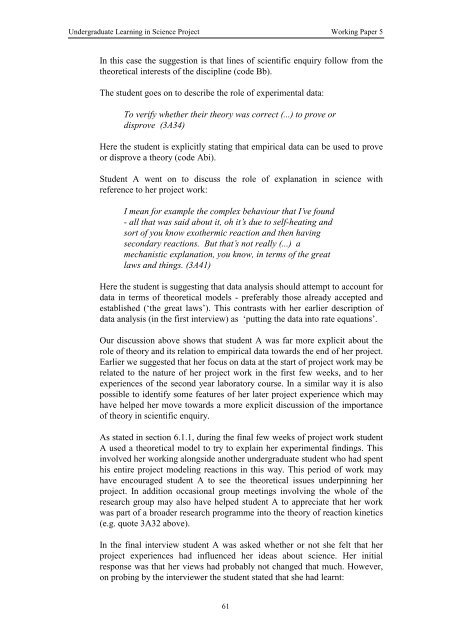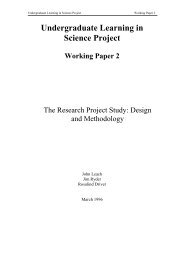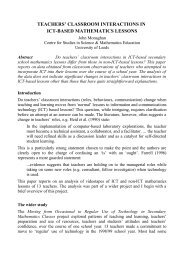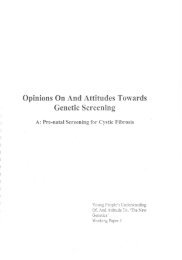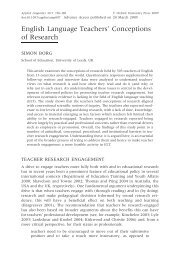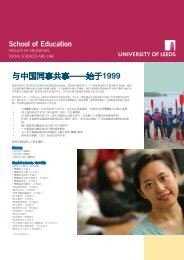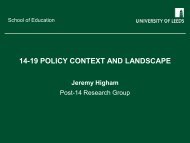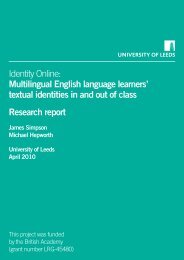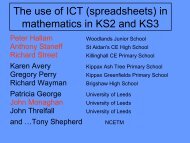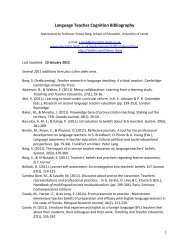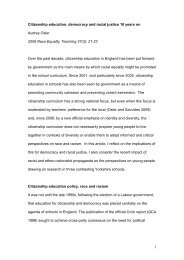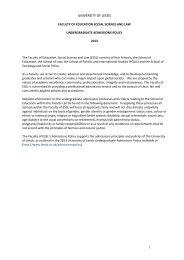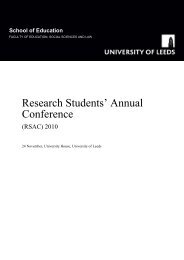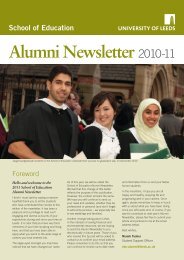Undergraduate science research projects and students - School of ...
Undergraduate science research projects and students - School of ...
Undergraduate science research projects and students - School of ...
Create successful ePaper yourself
Turn your PDF publications into a flip-book with our unique Google optimized e-Paper software.
<strong>Undergraduate</strong> Learning in Science Project Working Paper 5In this case the suggestion is that lines <strong>of</strong> scientific enquiry follow from thetheoretical interests <strong>of</strong> the discipline (code Bb).The student goes on to describe the role <strong>of</strong> experimental data:To verify whether their theory was correct (...) to prove ordisprove (3A34)Here the student is explicitly stating that empirical data can be used to proveor disprove a theory (code Abi).Student A went on to discuss the role <strong>of</strong> explanation in <strong>science</strong> withreference to her project work:I mean for example the complex behaviour that I’ve found- all that was said about it, oh it’s due to self-heating <strong>and</strong>sort <strong>of</strong> you know exothermic reaction <strong>and</strong> then havingsecondary reactions. But that’s not really (...) amechanistic explanation, you know, in terms <strong>of</strong> the greatlaws <strong>and</strong> things. (3A41)Here the student is suggesting that data analysis should attempt to account fordata in terms <strong>of</strong> theoretical models - preferably those already accepted <strong>and</strong>established (‘the great laws’). This contrasts with her earlier description <strong>of</strong>data analysis (in the first interview) as ‘putting the data into rate equations’.Our discussion above shows that student A was far more explicit about therole <strong>of</strong> theory <strong>and</strong> its relation to empirical data towards the end <strong>of</strong> her project.Earlier we suggested that her focus on data at the start <strong>of</strong> project work may berelated to the nature <strong>of</strong> her project work in the first few weeks, <strong>and</strong> to herexperiences <strong>of</strong> the second year laboratory course. In a similar way it is alsopossible to identify some features <strong>of</strong> her later project experience which mayhave helped her move towards a more explicit discussion <strong>of</strong> the importance<strong>of</strong> theory in scientific enquiry.As stated in section 6.1.1, during the final few weeks <strong>of</strong> project work studentA used a theoretical model to try to explain her experimental findings. Thisinvolved her working alongside another undergraduate student who had spenthis entire project modeling reactions in this way. This period <strong>of</strong> work mayhave encouraged student A to see the theoretical issues underpinning herproject. In addition occasional group meetings involving the whole <strong>of</strong> the<strong>research</strong> group may also have helped student A to appreciate that her workwas part <strong>of</strong> a broader <strong>research</strong> programme into the theory <strong>of</strong> reaction kinetics(e.g. quote 3A32 above).In the final interview student A was asked whether or not she felt that herproject experiences had influenced her ideas about <strong>science</strong>. Her initialresponse was that her views had probably not changed that much. However,on probing by the interviewer the student stated that she had learnt:61


